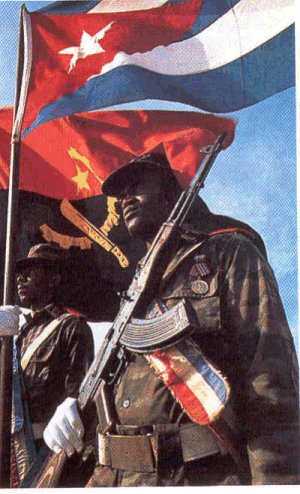Cuba’s Contributions to the Angola Revolution: A Selfless Independent Cuba
March 2, 2012 by jeditmore

A Cuban soldier is depicted alongside an Angolan soldier, with both countries' flags waving in the background.
The 1960s brought a new outlet for Cuban revolution and aid that wasn’t focused inwards towards Cuba. As Fidel Castro officially adopted the specific title of Prime Minister of the Revolution in Cuba, in 1974, Portugal was officially withdrawing from it’s colonial territories spread throughout Angola. With this withdrawal brought tension between opposing Angolan factions who desired control over the country’s capital, Luanda. As the People’s Movement for the Liberation of Angola (MPLA)—a Marxist Leninist labor party headed by Agostino Neto—struggled for influence against factions like UNITA and FNLA, Cuba was organizing their domestic house in order to be able to reach out to other countries’ revolutions.
Fidel Castro supplied 500 Cuban troops to the effort to bolster the MPLA. As South African troops became involved in the conflict, so too did the United States and the CIA–both backing UNITA and FNLA against the MPLA. As Castro himself put it, “At no time did the US president, or his powerful Secretary of State Henry Kissinger, or the US intelligence services, even imagine the possibility of participation by Cuba. Never before had a Third World country acted to support another people in an armed conflict beyond its geographical neighborhood.” The total deployment of more than 300,000 Cubans from 1975 to 1991 in Angola became the image of a selfless Cuba–a Cuba that fought for the revolution, wellbeing, and freedom of their neighbor. Castro pushed for the portrayal of a nonaligned movement in Angola—that is, there being no side taking with the Soviet Union nor the United States. In his speeches regarding the deployment, he discussed the lack of discourse and complete compliance between Cuba and the Soviet Union prior to and during this time in regards to Cuba’s support of Angola. Although the Soviet Union was pushing for extraction of Cuban troops in 1976, ultimately, Cuba’s men and women stayed throughout the the duration of the conflict, offering literacy, medical care, and support.
Castro mentions how Angolan armies were trained by Cuban soldiers, families in Cuba supported their loved ones abroad, and countless lives were lost, while today, as Castro mentioned in his 2005 ceremonial speech observing the 30th anniversary of the Cuban Military Mission in Angola, the US refuses to acknowledge the full story: “Cuba, it seems, never played any part at all in Angolan independence, Namibian independence or the defeat of the until-then invincible army of apartheid. In fact, Cuba doesn’t even exist; it’s a figment of people’s imagination. It is as if the US government had absolutely nothing to do with the hundreds of thousands of Angolan dead, the thousands of villages razed to the ground, the millions of landmines planted in Angolan territory, where they still take the lives of many children, women and other civilians.” Castro described how this wasn’t just a soldier’s job, it was the job of the Cuban revolutionary; doctors, teachers, men and women had been deployed to Angola to selflessly promote the ideals of the People’s Movement for the Liberation of Angola. 1991 saw the withdrawal of Cuban forces and the Angolan Civil War finally came to an end in 2002 with the passing of the head of the UNITA party, Jonas Savimbi.
Sources:
http://www.cuba.cu/gobierno/discursos/2005/ing/f021205i.html
November 10, 2011 Latin American History in the 20th Century class notes, Leslie Offutt
Cuba: What Everyone Needs to Know, Julia E. Sweig, (page 114)
Image Source: http://repeatingislands.com/2010/03/13/amateur-historian-writes-book-on-cuban-soldiers-in-angola/
6 Responses to “Cuba’s Contributions to the Angola Revolution: A Selfless Independent Cuba”
Leave a Reply
You must be logged in to post a comment.
tile grout repair and replacement cam gloucesteshire
http://www.gloucestercarpetcleaning.com
Going On this site
Clint Labianca
Nydia Zeff
how to start your own podcast